|
|
|
Sort Order |
|
|
|
Items / Page
|
|
|
|
|
|
|
| Srl | Item |
| 1 |
ID:
133719
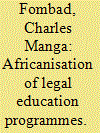

|
|
|
|
|
| Publication |
2014.
|
| Summary/Abstract |
Debates and discussions about the African renaissance and the Africanisation of universities have raged for decades. The goal of developing an emancipatory Afrocentric system that frees African education from the continuous and dominant influence of Euro- and American-centric cultural values remains a challenge. This is particularly so with respect to conventional African legal training and research programmes. Some African legal scholars, sometimes imbued with xenophilia, have in many ways participated in the process that has seen the continuous marginalisation of studies on the law in Africa and African law. This paper argues that there is a need to rethink the place devoted to the study of African law and African legal systems. It contends that African law generally and African legal systems specifically will hardly be able to develop when present-day students spend most of their time, especially in a course such as comparative law, studying western legal systems. In order for African legal education to be relevant and meaningful it must prepare and equip today's lawyers to operate in a global world. It is therefore suggested that an Africanised legal programme should include a course on African legal studies and aim to be contextually and globally relevant whilst being sufficiently innovative and flexible to address the urgent needs of our times.
|
|
|
|
|
|
|
|
|
|
|
|
|
|
|
|
| 2 |
ID:
133723
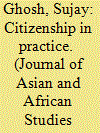

|
|
|
|
|
| Publication |
2014.
|
| Summary/Abstract |
Citizenship is essentially about membership in society which enables citizens to participate in the affairs of their community on roughly equal terms and culturally enjoins upon them to collectively surmount their commonly felt problems, such as poverty. The role of Self-Help Groups (SHGs) should be understood in this context. Through observation and conversation-analysis methods, this paper studies two SHGs in India: the successful one practiced citizenship, envisaged a sense of community and made progress towards capacity building and empowerment, especially pertaining to education, health and sanitation. It concludes that in developing countries, citizens acquire the appropriate virtues through participation in the programmes linked with their vision of well-being and thus strengthen the cause of citizenship.
|
|
|
|
|
|
|
|
|
|
|
|
|
|
|
|
| 3 |
ID:
133724
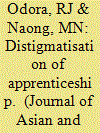

|
|
|
|
|
| Publication |
2014.
|
| Summary/Abstract |
The intention of this paper is two-fold; firstly, it is to explore the causal effect of perceived negativity towards Further Education and Training (FET) college education among South African youth. Secondly, it is to determine the impact of apprenticeship on the development of entrepreneurial knowledge and skills among FET college students. The FET sector serves a particular function, which is the imparting of hands-on vocational training, intended to inculcate and promote a culture of self-employment, considered a necessity for employment creation. A questionnaire was used to collect data from 112 randomly selected students from three Motheo FET colleges. The findings reveal very contrasting results, a direct correlation between apprenticeship and entrepreneurship; however, 53% of the respondents did not feel sufficiently equipped, ready and confident enough to start their own businesses after graduation. About 48% feel the need to further their studies at university in order to stand a better chance of landing a good job.
|
|
|
|
|
|
|
|
|
|
|
|
|
|
|
|
| 4 |
ID:
133720
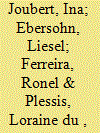

|
|
|
|
|
| Publication |
2014.
|
| Summary/Abstract |
The purpose of this study was to explore and describe the nature of a reading culture in a rural secondary school in South Africa before and after a literacy intervention. The systems theory with interpretivism as the epistemological paradigm was employed. A rural secondary school was selected as part of an on-going Flourishing Learning Youth and Supportive Teachers Assets and Resilience studies on resilience and rural schools. Language teachers (n = 6, male = 1, female = 5) were purposively selected to participate. The literacy intervention was developed with phonetic acquisition as the basis to develop reading skills. It became evident that implementing English (additional language) as teaching and learning language in the school may have contributed to barriers to learning. Limited resources and reading instruction training exacerbated the problems. However, once the teachers acquired new skills and the children received the needed support, the improvement in overall academic achievement was significant.
|
|
|
|
|
|
|
|
|
|
|
|
|
|
|
|
| 5 |
ID:
133726
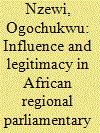

|
|
|
|
|
| Publication |
2014.
|
| Summary/Abstract |
This article examines non-legislative avenues for parliamentary influence and legitimacy in the Pan-African Parliament (PAP). It argues for an incremental approach to increasing the powers of the PAP. To make this case, the paper first expounds on the composite nature of regional parliaments, showing the convergence of complex political and institutional issues that make Regional Parliamentary Assemblies unique parliamentary entities. Given the unsuccessful attempt by the PAP to increase its legislative powers through an amendment of its protocol, the aim is to make an alternative argument for legislative powers by locating the legal and institutional legitimacy and influence drivers for the PAP.
|
|
|
|
|
|
|
|
|
|
|
|
|
|
|
|
| 6 |
ID:
133721
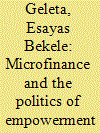

|
|
|
|
|
| Publication |
2014.
|
| Summary/Abstract |
This article challenges the widely accepted assumption that the provision of microfinance to poor women through organizing them in groups empowers them. The current popular thinking in development studies considers microfinance as the best remedy not only for poverty, but also for social disintegration and women's subordination. This article argues that such analysis ignores the cultural roots of inequality, subordination and destitution. Drawing on Bourdieu's sociological frameworks, the article constructs a critical cultural model and elucidates the complexity of gender relations in microfinance process. The article explores gendered cultural norms and expectations that control and influence microfinance practices and contributes towards a more adequate and critical theoretical understanding of its empowerment potential.
|
|
|
|
|
|
|
|
|
|
|
|
|
|
|
|
| 7 |
ID:
133725
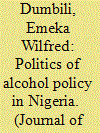

|
|
|
|
|
| Publication |
2014.
|
| Summary/Abstract |
The global call by the World Health Assembly (WHA) to control the rising alcohol-related problems caused by harmful consumption became necessary in 2005 due to the recognition of the fact that many countries did not have alcohol policies. This gave rise to the adoption of a 10-point policy strategy by the World Health Organization (WHO) Member States in 2010. Against this backdrop, many countries adopted alcohol policies to reduce harmful alcohol consumption. Nigeria was one of the WHO Member Countries that adopted the resolution. Globally, Nigeria is among the 30 countries with the highest per capita consumption and alcohol-related problems, yet has not formulated alcohol policy to date. This paper draws on Eisenberg's Strategic Ambiguity Model to explore the role of brewers in supplanting alcohol policy initiatives in Nigeria. It argues that the leading alcohol producers in Nigeria have been the main reason alcohol policies have not been formulated. The article focuses on why their campaigns for responsible drinking, promotions, sponsorships and 'strategic social responsibilities' may have increased since the WHA made the call and the WHO adopted the resolution in 2010. It concludes by arguing that there is an urgent need to formulate policies drawing from the WHO resolution to curtail the activities of these brewers and reduce harmful consumption.
|
|
|
|
|
|
|
|
|
|
|
|
|
|
|
|
| 8 |
ID:
133722
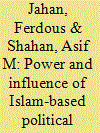

|
|
|
|
|
| Publication |
2014.
|
| Summary/Abstract |
Bangladesh has received scholarly attention about the extent and nature of Islamism in the political domain. We argue that, to analyze the significance of religion in the political process, it is essential to consider the role of religion in both influencing the policy and electoral outcome. Based on an in-depth qualitative study during the most recent election of 2008, we review previous elections results and the policy influence of religion-based parties; we argue that, in Bangladesh, Islamic parties' policy influence is very high and electoral success is very low. A deeply entrenched civil religion in the form of nationalistic identity bars religion from playing a significant role in influencing the voting behavior of the citizens. The mainstream political parties have so far failed to recognize the significance of this civil religion.
|
|
|
|
|
|
|
|
|
|
|
|
|
|
|
|
|
|
|
|
|